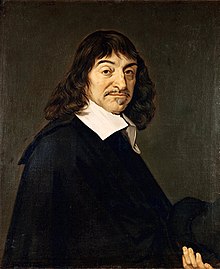
Back مبدأ الكوجيتو Arabic মই ভাবোঁ, গতিকে মই আছোঁ Assamese Cogito ergo sum AST Cogito, ergo sum Azerbaijani Cogito, ergo sum Catalan من دەفکرم، واتە ھەم CKB Cogito ergo sum Czech Cogito ergo sum CV Cogito ergo sum Danish Cogito ergo sum German

| Part of a series on |
| René Descartes |
|---|
 |
The Latin cogito, ergo sum, usually translated into English as "I think, therefore I am",[a] is the "first principle" of René Descartes's philosophy. He originally published it in French as je pense, donc je suis in his 1637 Discourse on the Method, so as to reach a wider audience than Latin would have allowed.[1] It later appeared in Latin in his Principles of Philosophy, and a similar phrase also featured prominently in his Meditations on First Philosophy. The dictum is also sometimes referred to as the cogito.[2] As Descartes explained in a margin note, "we cannot doubt of our existence while we doubt." In the posthumously published The Search for Truth by Natural Light, he expressed this insight as dubito, ergo sum, vel, quod idem est, cogito, ergo sum ("I doubt, therefore I am — or what is the same — I think, therefore I am").[3][4] Antoine Léonard Thomas, in a 1765 essay in honor of Descartes presented it as dubito, ergo cogito, ergo sum ("I doubt, therefore I think, therefore I am").[b]
Descartes's statement became a fundamental element of Western philosophy, as it purported to provide a certain foundation for knowledge in the face of radical doubt. While other knowledge could be a figment of imagination, deception, or mistake, Descartes asserted that the very act of doubting one's own existence served—at minimum—as proof of the reality of one's own mind; there must be a thinking entity—in this case the self—for there to be a thought.
One critique of the dictum, first suggested by Pierre Gassendi, is that it presupposes that there is an "I" which must be doing the thinking. According to this line of criticism, the most that Descartes was entitled to say was that "thinking is occurring", not that "I am thinking".[5]
Cite error: There are <ref group=lower-alpha> tags or {{efn}} templates on this page, but the references will not show without a {{reflist|group=lower-alpha}} template or {{notelist}} template (see the help page).
- ^ Burns, William E. (2001). The Scientific Revolution: An Encyclopedia. Santa Barbara, California: ABC-CLIO. p. 84. ISBN 978-0-87436-875-8.
- ^ "COGITO | Meaning & Definition for UK English | Lexico.com". Lexico Dictionaries | English. Archived from the original on March 8, 2021. Retrieved 2022-07-11.
- ^ Adam, Charles; Tannery, Paul, eds. (1901), "La Recherche de la Vérité par La Lumiere Naturale", Oeuvres de Descartes, vol. X, p. 535.
- ^ Hintikka, Jaakko (1962). "Cogito, Ergo Sum: Inference or Performance?". The Philosophical Review. 71 (1): 3–32. doi:10.2307/2183678. ISSN 0031-8108. JSTOR 2183678.
- ^ Cite error: The named reference
thinkingisoccurringwas invoked but never defined (see the help page).